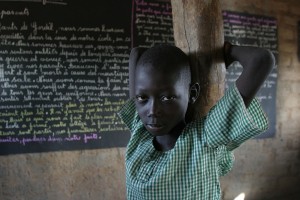The conflict in the Central African Republic (‘CAR’) is worsening every day. With over 500,000 people displaced within the country, children are the most affected by the crisis. This particularly vulnerable population has the right to protection and assistance, which creates a major challenge for humanitarian aid workers.

Weapons of war in the hands of children
For months now, children in the Central African Republic have been the victims of bullets and machete blows, whether they are killed or maimed by horrific injuries. According to Souleymane Diabaté, a UNICEF representative in the CAR, the crisis currently affects 2 million children, 4000 of whom have been recruited by armed groups. Others are the direct targets of atrocities.
He declared that, “regardless of whether they are Muslims or Christians, the children in the Central African Republic are not safe“.
Furthermore, while the conflict started with only bullets being fired, the situation has now evolved to the extent that machetes, hand grenades and kalashnikovs are being used. Dr Antonio Rignone, a surgeon with the NGO Emergency, describes the injuries of his child patients as “real war wounds”.
Children among soldiers and the internally displaced[1]
The internally displaced are particularly vulnerable because in attempting to escape physical violence, they immediately lose their everyday living environment, accommodation, food and water. Families are very often torn apart and the risk of sexual violence is extremely high, even within the camps.
A few dozen orphaned children have found refuge at the Don Bosco church while waiting to be placed in homes. But most children have no roof over their head, which makes them easy prey for attackers.
Many youngsters are also recruited into armed groups. School closures have made it easier to enlist children as soldiers, whether in rebel groups or in pro-government militias.
Serious violation of international humanitarian law
The current situation in the CAR exemplifies the violation of international humanitarian law, which prohibits, among other things, attacks on civilians, the destruction of essential goods, and disrespect for the free movement of relief supplies as well as for life-sustaining assistance for civilians.
Internal displacement is already, in itself, a result of the violation of this law since civilians are fleeing fighters who do not respect their right to protection. In recent months, the Muslim minority, in particular, has been feeling the effects of the crisis, though it must not be forgotten that all segments of the population are increasingly affected. While at the moment some members of of the Muslim community are leaving the capital, Bangui, to go to the North of the country, different humanitarian aid groups are staying in the area. These include UNICEF, UNHCR, the UN World Food Programme, the Danish Refugee Council, Médecins sans frontières and SOS Children’s Villages.
We are reaching out to the international community and appeal to the government, religious authorities and civil society to work towards peace.
Written by : Asli Kaya
Translator : Bronwen-Claire Ewens
For a detailed overview of the situation:
1- http://reliefweb.int/sites/reliefweb.int/files/resources/CAR_conflict_feb_2014_executive_summary.pdf
2- http://www.huffingtonpost.fr/2013/10/13/chronologue-guerre-crise-centrafrique_n_4029289.html [French]
3- http://www.msf-azg.be/fr/dossier/violence-et-instabilite-politique-en-republique-centrafricaine [French]
4- http://www.irenees.net/bdf_fiche-analyse-1011_fr.html [French]
Sources:
1- UNHCR
2- UNICEF
3- Central African News Agency (Agence Centrafrique Presse): http://www.acap-cf.info/Le-Representant-de-l-Unicef-Bangui-M-Souleymane-Diabate-deplore-les-attaques-contre-les-enfants_a5725.html [French]
4- ICRC
5- Médecins sans frontières
6- RFI [Radio France Internationale]
[1] Unlike refugees, internally displaced persons do not cross any international border. They are forced to leave their homes and remain within their country.

